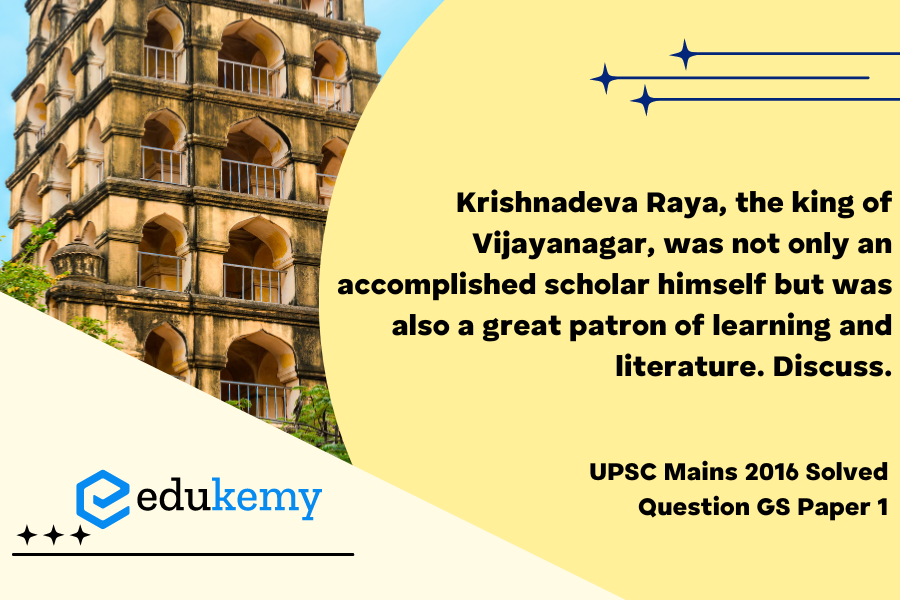Krishnadeva Raya, the illustrious king of the Vijayanagar Empire during the 16th century, emerges as a fascinating blend of regal prowess and intellectual excellence. Not merely content with the responsibilities of statecraft, Krishnadeva Raya distinguished himself as an accomplished scholar, showcasing a rare convergence of political acumen and literary finesse. His reign stands out not only for the territorial expanses he controlled but also for the vibrant cultural and intellectual renaissance he fostered. Krishnadeva Raya’s commitment to scholarship, marked by his proficiency in various languages and the arts, underscores his dedication to the pursuit of knowledge.
Tag: Indian culture.
Contents
Decoding the Question:
- In Introduction, try to mention about Krishnadeva Raya.
- In Body, elaborate on Krishnadeva Raya’s contribution in literature.
- Conclude with the statement like Krishnadevaraya of Vijayanagara was at the apex of a south Indian cultural renaissance, etc.
Answer:
Krishnadeva Raya was a great patron of literature and was known as Abhinava Bhoja. Himself being a scholar, he wrote the Telugu work Amuktamalyada and a Sanskrit play, Jambavati Kalyana.
He is said to have been a master of several languages. His reign is regarded as a golden age of Kannada literature, but he also patronized Telugu, Sanskrit, and Tamil poets in his court.
Krishnadeva Raya’s contribution in literature: accomplished scholar & great patron of learning.
Contribution to Kannada Literature:
- Krishna Deva Rayana Dinachari in Kannada highlights contemporary society during Krishna Deva Raya’s time. It is still debatable among historians whether the record was written by the king himself, but undoubtedly it is said to be one of the most authentic sources to interpret social life during his time.
- Kannada poet Mallanarya, Satyendra Chola-kathe, Chatu Vittal-anatha who wrote Veera-saivamruta, Bhava-china-Ratna and Bhaga-vatha respectively, was patronized by Krishnadeva Raya.
Contribution in Telugu Literature: His contribution in art and literature marked a zenith in vernacular literature as he composed a work on statecraft in Telugu known as the Amuktamalyada.
- In his court, eight Telugu poets were regarded as the eight pillars of the literary assembly. Mythologically, it was believed that eight elephants were holding the earth in eight different directions.
- Therefore, the title ‘Ashtadiggajas’ was used to celebrate this belief and hence the court was also called Bhuvana Vijayam (Conquest of the World).
- The most celebrated poets in his court were Allasani Peddana and Nandi Timmaha who wrote the Parijatapaharana.
- The period of the Krishnadeva Raya Empire is known as Prabandha Period i.e., semi-historical anecdotes about famous persons.
- Allasani Peddana was given the title of Andhra Kavita Pitamaha (the father of Telugu poetry). Svarocisha Sambhava or Manucharita is his popular prabandha work and was dedicated to Krishnadevaraya.
- It is said whenever Krishna-devaraya met the poet while riding on his elephant, he gave him a lift.
Contribution to Sanskrit Literature:
- Sanskrit literature was given patronage by the Krishnadeva Raya.
- Bhakti saint Vallabhacharya visited the court of Krishnadevaraya and scored a triumph over the Saivas in public debate. Impressed by young man’s intelligence and clarity of thought, Krishnadeva raya announced the title “acharya” to the saint.
According to Nidatavolu Venkata Rao, the reign of Krishnadevaraya is a glorious chapter in South Indian literary history. It is still believed that Krishnadeva Raya continues to hold sway over the public imagination in the southern states as well as other parts of the country, even after the lapse of five centuries, for the great services he rendered to the Indian culture and literature in general and Telugu, Kannada, Sanskrit literature in particular.
In case you still have your doubts, contact us on 9811333901.
For UPSC Prelims Resources, Click here
For Daily Updates and Study Material:
Join our Telegram Channel – Edukemy for IAS
- 1. Learn through Videos – here
- 2. Be Exam Ready by Practicing Daily MCQs – here
- 3. Daily Newsletter – Get all your Current Affairs Covered – here
- 4. Mains Answer Writing Practice – here


